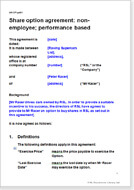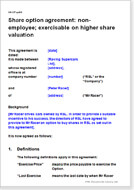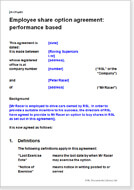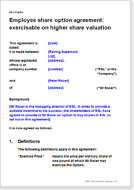These share option agreements allow employees, including directors, or a third party, such as a sales agent or distributor, to be rewarded in line with the increased performance of the company. The agreements cover options triggered by either an increase in the value of the company or share price, or the attainment of some specified targets.
Share option agreement: non-employee; performance based
Use this agreement to grant a share option to a third party who is not an employee (or not yet, at least). It is based on his results or achievement. Conditions to trigger the option are to be entered by you. Suitable for any business. He may be associated in any capacity. Example: a third party Internet marketer working for an Internet business or a contracted operator of a hotel or adventure park or leisure facility.
Share option agreement: non-employee
This agreement covers a situation where the optioner is not an employee. The agreement is for the option to crystalise when the company share valuation reaches a certain level. The optioner may be associated in any capacity. Suitable for any business. Example: a third party Internet marketer working for an Internet business or a contracted operator of a hotel or adventure park or leisure facility.
Employee share option agreement: performance based
Use this agreement to grant a share option to an employee based on his success or achievement. He may be employed in any capacity. Suitable for any business. The conditions to trigger option to be entered by you.
Employee share option agreement
Use this agreement to grant a share option to an employee based on an increased valuation of the shares. He may be employed in any capacity. Suitable for any business. The conditions to trigger option to be entered by you. Example given.

If the document isn’t right for your circumstances for any reason, just tell us and we’ll refund you in full immediately.

We avoid legal terminology unless necessary. Plain English makes our documents easy to understand, easy to edit and more likely to be accepted.

You don’t need legal knowledge to use our documents. We explain what to edit and how in the guidance notes included at the end of the document.

Email us with questions about editing your document. Use our Lawyer Assist service if you’d like our legal team to check your document will do as you intend.

Our documents comply with the latest relevant law. Our lawyers regularly review how new law affects each document in our library.
Easy to use agreements
These four agreements are very similar in structure and content. The only differences relate to:
- whether your counter party is an employee or a third party
- whether the exercise of the option is to be triggered by increased personal performance or by a higher valuation
What event triggers the option in your case is obviously very important. Since that could be unique for your business, we have used “performance” and “higher share price” as the most likely and allow you to specify in more detail, if required, the exact conditions.
The documents are structured so that the trigger can be set down in a schedule. You do not have to edit the main paragraphs in the document.
Once the document is signed and dated, it is legally binding. Just because the details are in the schedule rather than the main document does not mean they can be changed without agreement by all parties.
We have provided for your counter party to pay for the option and also to pay for the shares on exercising it. Either or both provisions may be deleted or the sums increased or reduced.
Also consider a new shareholders’ agreement
This would also be a good time to put into place a new shareholders’ agreement whilst you are in charge of the shares. If you wait until the option holder is a new shareholder, you will have to take greater account of what he wants!
The law relating to these agreements
This document is drawn under basic contract law. There are no special rules, tax arrangements, or other legal complications that need to be considered with an agreement of this type.
Profit sharing schemes Ireland
Approved Profit-Sharing Schemes allow an employer to give an employee share in the company up to a maximum value of €12,700 per year tax-free. Approved Profit-Sharing Schemes are subject to certain conditions set out in legislation and administered by the Revenue Commissioners.
Providing the scheme meets the required conditions, an employee will pay no tax on shares up to a maximum value of €12,700 per year. The employer must hold the shares for a period of time (called the "retention period") and the employee must not dispose of the shares before three years. If an employee disposes of shares before this time, he or she is liable to pay income tax on whichever is the lower of the following:
- the market value of the shares when they were given to the employee; or
- the value of the shares at the time of sale.
Approved Share Options Scheme rules came into effect in 2001. Under these rules, if an employee purchases shares from a company at preferential price, then he or she becomes liable for Capital Gains Tax of 20 cent in the euro if he or she sells the shares. The Capital Gains Tax is charged on the difference between the purchase price and the subsequent sale price of the shares.
Unapproved Share Option Schemes require the employee to pay tax on the difference between the market value of the shares and the purchase price of the shares at the time the employee exercises the right to buy them. If the employee subsequently sells the shares, he or she is also liable for Capital Gains Tax if the shares have increased in value from the time of purchase to the time of sale.
All rights reserved




